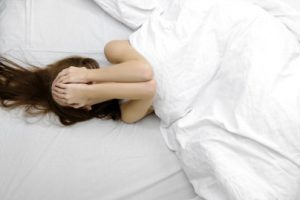
coloroftime/Getty Images
Whether it’s a few sleepless nights from time to time or long-term insomnia, millions of people are tired. Test how much you know about how to get a good night’s sleep — and what to do when you can’t — in our insomnia quiz.
1.
True or false: Insomniacs have difficulty staying asleep, not just falling asleep.
true
True. When you experience insomnia, you might wake up frequently in addition to experiencing difficulty falling asleep.
false
2. How many hours of sleep does an adult need every night?
While individual needs vary, 7 to 9 hours of sleep is considered the ideal range for adults.
The American Academy of Sleep estimates about 30 to 40 percent of adults suffer symptoms of insomnia annually.
About 5 percent of adults admit they’ve fallen asleep behind the wheel at least once in the last 30 days.
All of these problems are caused by insomnia, as well as moodiness, difficulty thinking and having a short temper.
7. True or false: Certain antidepressants may cause insomnia.
14. True or false: Eating a large meal before bed will help you sleep.
true
false
False. Eating a large meal within 2 to 3 hours of your bedtime may aggravate sleep disorders.
15. What is sleep hygiene?
your sleep habits
Sleep hygiene describes your sleep habits.
how often you wash your sheets
showering before bed
16. Which 19th-century novelist and insomnia-sufferer walked in circles until she fell asleep?
Jane Austen
Charlotte Brontë
Emily Brontë
Emily Brontë is said to have suffered from chronic insomnia.
George Eliot
17. Who among these groups is at the highest risk for developing insomnia?
women
Women are at a high risk for developing insomnia.
men
adolescents
infants
18. Which pre-bedtime activity may help ease insomnia symptoms?
exercise
lying in bed, waiting to sleep
having a nightcap
relaxation techniques
Relaxation techniques, such as meditation or a warm bath, may make it easier to fall — and stay — asleep.
19. True or false: Sleeping pills may actually worsen insomnia symptoms.
true
True. While sleeping pills may help in the short term, long term usage may actually worsen insomnia symptoms.
false
20. Which over-the-counter supplement may help relieve insomnia?
valerian
melatonin
glucosamine
both valerian and melatonin
Both valerian and melatonin may help ease the symptoms of insomnia, but their efficacy and safety isn’t proven.
Click Here to learn how to Cure Snoring and Sleep Apnea

Cure Your Insomnia in 6 Simple Steps & Start Sleeping for 8 Hours Every Night – in Just 3 Days!

No Comments Yet